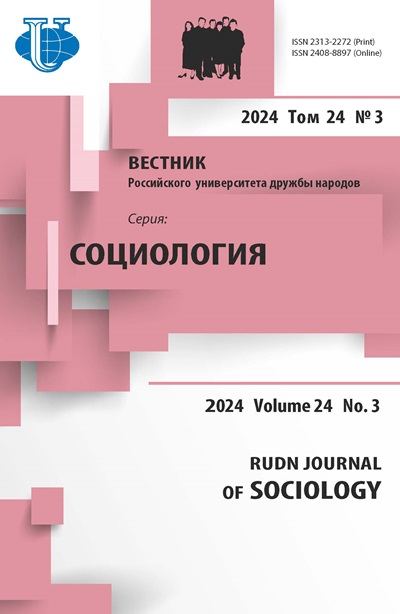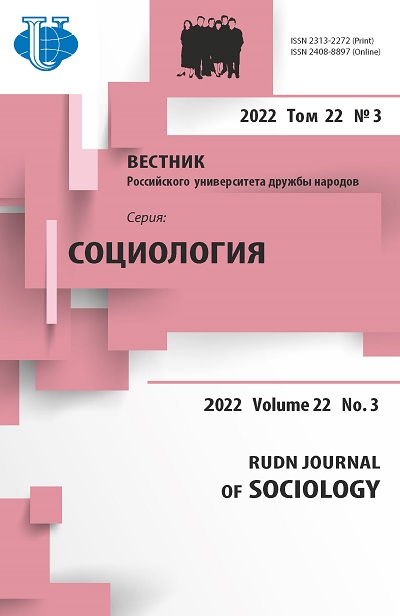Starting positions of university applicants and features of their further education: A sociological analysis
- Authors: Aleshkovski I.A.1, Gasparishvili A.T.2,1,3, Krukhmaleva O.V.2,1, Narbut N.P.2,3, Savina N.E.1
-
Affiliations:
- Lomonosov Moscow State University
- RUDN University
- Istitute of Sociology of FCTAS RAS
- Issue: Vol 22, No 3 (2022)
- Pages: 557-571
- Section: Contemporary society: the urgent issues and prospects for development
- URL: https://journals.rudn.ru/sociology/article/view/32039
- DOI: https://doi.org/10.22363/2313-2272-2022-22-3-557-571
Cite item
Full Text
Abstract
The article considers the features of students’ educational trajectories as depending on how they entered the university. A distinctive feature of the Russian system of higher education is various grounds for the educational transition “school-university”: the results of the Unified State Exam, school Academic Olympics in key subjects, employer-sponsored education, and quotas. These grounds seem to affect the further education of students and the quality of training and professional trajectories. At the same time, the resistance of the higher education system to external challenges, its sustainable competitiveness, modernization and the search for new forms and models of work with the talented youth are priority development tasks of the national higher education system. The article presents the results of the comparative analysis of the students’ motivation for learning, educational achievements, ideas about possible professional and educational trajectories. The analysis is based on the data of the Russian students survey conducted by the Center for Educational Development Strategy of the Lomonosov Moscow State University and RUDN University in November-December 2021 (N = 37457). The research findings show that at the stage of the transition from school to university, there is a very heterogeneous student inflow by quality and forms of training, individual abilities and inclinations, motivation and requests to the higher education. There is a special group - prize-winners of school Academic Olympics - of the most talented and promising applicants. The admission companies show that variable grounds for entering universities lead to certain conflicts and contradictions in the higher education system.
About the authors
I. A. Aleshkovski
Lomonosov Moscow State University
Email: narbut-np@rudn.ru
кандидат экономических наук, директор Центра стратегии развития образования
Leninskie Gory, 1, Moscow, 119991, RussiaA. T. Gasparishvili
RUDN University; Lomonosov Moscow State University; Istitute of Sociology of FCTAS RAS
Email: aleshkovski@yandex.ru
кандидат философских наук, заместитель директора Центра стратегии развития образования Московского государственного университета имени М.В. Ломоносова; доцент кафедры социологии Российского университета дружбы народов; старший научный сотрудник Института социологии Федерального научно-исследовательского социологического центра Российской академии наук
Miklukho-Maklaya St., 6, Moscow, 117198, Russia; Leninskie Gory, 1, Moscow, 119991, Russia; Krzhizhanovskogo St., 24/35-5, Moscow, 117218, RussiaO. V. Krukhmaleva
RUDN University; Lomonosov Moscow State University
Email: gasparishvili@yandex.ru
кандидат социологических наук, заведующая отделом Центра стратегии развития образования Московского государственного университета имени М.В. Ломоносова; доцент кафедры социологии Российского университета дружбы народов
Miklukho-Maklaya St., 6, Moscow, 117198, Russia; Leninskie Gory, 1, Moscow, 119991, RussiaN. P. Narbut
RUDN University; Istitute of Sociology of FCTAS RAS
Email: kruhoks@yandex.ru
доктор социологических наук, заведующий кафедрой социологии Российского университета дружбы народов; главный научный сотрудник Института социологии Федерального научно-исследовательского социологического центра Российской академии наук
Miklukho-Maklaya St., 6, Moscow, 117198, Russia; Krzhizhanovskogo St., 24/35-5, Moscow, 117218, RussiaN. E. Savina
Lomonosov Moscow State University
Author for correspondence.
Email: savina.opinio@yandex.ru
научный сотрудник Центра стратегии развития образования
Leninskie Gory, 1, Moscow, 119991, RussiaReferences
- Abankina T.V. Razvitie seti obshcheobrazovatelnyh uchrezhdenij v regionah: rezultaty realizatsii prioritetnogo natsionalnogo proekta “Obrazovanie” v 2007–2008 gg. [Development of the educational institutions network in regions: Results of the priority national project “Education” in 2007–2008]. Voprosy Obrazovaniya. 2009; 2. (In Russ.).
- Agranovich M. Pochemu pobediteli olimpiad zanimayut v vuzah bolshinstvo byudzhetnyh mest [Why the winners of the school Academic Olympics take most budget places in universities]. Rossiyskaya Gazeta, No. 185. 16.08.2021. (In Russ.).
- Bolotov V.A., Valdman I.A. Kak obespechit effektivnoe ispolzovanie rezultatov otsenki obrazovatelnyh dostizhenij shkolnikov [How to ensure the effective use of the results of the assessment of schoolchildren’ educational achievements]. Obrazovatelnaya Politika. 2012; 1. (In Russ.).
- Bolotov V.A., Gorbovsky R.V., Waldman I.A. and al. Postuplenie v vuzy v postsovetskih stranah: ekzameny kak instrument resheniya gosudarstvennyh zadach [Admission to Universities in Post-Soviet Countries: Exams as a Means of Solving State Tasks]. Moscow; 2020. (In Russ.).
- Bourdieu P., Passron J.-K. Vosproizvodstvo: elementy teorii sistemy obrazovaniya [Reproduction: Elements of the Education System Theory]. Moscow; 2007. (In Russ.).
- Donskaya K. Istoriya olimpiadnogo dvizheniya [History of the school Academic Olympics movement]. URL: https://olimpiada.ru/article/687. (In Russ.).
- Konstantinovsky D.M., Voznesenskaya B.D., Cherednichenko G.A., Khokhlushkina F.A. Obrazovanie i zhiznennye traektorii molodezhi: 1998–2008 gody [Education and Life Trajectories of the Youth: 1998–2008]. Moscow; 2011. (In Russ.).
- Kuzminov Ya., Frumin I. Korrelyatsiya olimpiad i vektorov akademicheskoj mobilnosti [Correlation of school Academic Olympics and vectors of academic mobility]. Rector Vuzа. 2012; 3. (In Russ.).
- Lepeshev D.V. Aktualnye problemy po organizatsii raboty s odarennymi i talantlivymi detmi [Actual issues of organizing the work with gifted and talented children]. Nauka i Realnost. 2020; 3.1. (In Russ.).
- Monitoring kachestva priema v vuzy — 2021 [Monitoring of the quality of the admission to universities — 2021]. URL: https://www.hse.ru/ege2021. (In Russ.).
- Ministerstvo prosveshcheniya Rossiyskoy Federatsii: olimpiady [Ministry of Education of the Russian Federation: Olympiads]. URL: https://edu.gov.ru/activity/main_activities/olympiads. (In Russ.).
- Narbut N.P., Trotsuk I.V. Zhiznennye plany rossiyskih studentov: ozhidaniya i opaseniya v professionalnoy sfere [Russian students’ life plans: Expectations and concerns in the professional field]. RUDN Journal of Sociology. 2014; 2. (In Russ.).
- Narbut N.P., Trotsuk I.V. Repertuar strakhov rossiyskogo studenta: po materialam empiricheskogo proekta [Russian students’ main fears: The results of an empirical study]. RUDN Journal of Sociology. 2013; 4. (In Russ.).
- Prakhov I.A. Obzor osnovnyh modelej perekhoda “shkola–vuz” v zapadnoevropejskih stranah i SShA [An overview of the main models of the “school– university” transition in the West European countries and USA]. Voprosy Obrazovaniya. 2009; 2. (In Russ.).
- Peresetsky A.A., Davtyan M.A. Effektivnost EGE i olimpiad kak instrumenta otbora abiturientov [The efficiency of the USE and school Academic Olympics as a tool for selecting applicants]. Prikladnaya Econometrika. 2011; 3. (In Russ.)
- Roschina Ya.M., Drugov M.A. Vybor professii: po lyubvi ili po raschetu? [Choice of profession: for love or by design?] Preprint. Seriya WP3: Problemy rynka truda. Moscow; 2002. (In Russ.).
- Statistika ballov EGE 2021 g. [Statistics of the USE results for 2021]. URL: https://blog. maximumtest.ru/post/statistika-ballov-egeh-2021.html. (In Russ.).
- Khavinson T.E., Solovieva A.A. Svyaz rezultatov Edinogo gosudarstvennogo ekzamena i uspevaemosti v vuze [The relationship between the results of the Unified State Exam and academic performance at the university]. Voprosy Obrazovaniya. 2014; 1. (In Russ.).
- Ilishkinaa D., Bruin A., Podolskiy A., Volkd M., Van Merriënboera J. Understanding selfregulated learning through the lens of motivation: Motivational regulation strategies vary with students’ motives. International Journal of Educational Research. 2022; 113.
- Julien F., Bureau S. Motivation at school: Differentiation between and within school subjects matters in the prediction of academic achievement. Contemporary Educational Psychology. 2018; 54.
- Komulainenb E., Huurrea T., Aroa H., Rahkonenb О. Health, lifestyle, family and school factors in adolescence: Predicting adult educational level. Educational Research. 2006; 48 (1).
- Niedlich S., Kallfaß A., Pohle S., Bormann I. A comprehensive view of trust in education: Conclusions from a systematic literature review. Review of Education. 2021; 9 (1). 2021.
- Reay D. Unequal childhoods: Class, race and family life. American Journal of Sociology. 2006; 112 (2).
- Redford J. The Effects of Concerted Cultivation on Academic Achievement. Richmond; 2007.
- Toomsalu-Stefanova L.M., Fokina E.N., Molchanovа A.V., Berduygina O.N. Study of the quality of applicants’ admission to universities based on the results of the Unified State Exam in Russia. International Journal of Instruction. 2020; 13 (2).
Supplementary files
There are no supplementary files to display.














